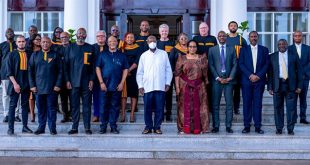
Why keeping them closed is dangerous
Kampala, Uganda | RONALD MUSOKE | Reagan Okello, 18, had just started his Form 3 when President Yoweri Museveni suddenly closed schools when the COVID-19 disease entered the country in March, last year.
It has been a tough 17 months since for Okello who has been watching the back-and-forth discussions of whether schools should reopen or not. Okello, a student at Kololo S.S in Kampala, is angry and frustrated. He feels stuck in Form 4.
“I have grown so tall for my class and people tease me that my teachers will “fear” teaching me whenever schools resume,” he told The Independent on Aug.19.
Okello is almost six foot tall and of medium build and he says he is getting fed up with the indecision of the government. He says he is even contemplating giving up on school should the government not reopen schools this year.
Soon after President Museveni ordered schools closed, the government arranged programmes on radio and TV to enable the almost 15 million affected learners across all levels to continue learning.
Many learners, especially from rural, low income backgrounds, failed to access the virtual learning. But Okello was among the lucky urban learners with a TV at home. He says he religiously followed the television learning schedule and concentrated on reading his books.
He says it was even easier when the government selected his physics teacher to teach the subject on TV. He even encouraged 13 of his classmates to form a discussion group on WhatsApp.
But the more the government kept postponing the reopening of schools, the more Okello’s WhatsApp group members got demoralized. He says, many left for the village and they did not have money to buy internet data bundles. By September, last year, the group had completely gone silent.
Okello too got bored of staying home. His mother who cooks and sells food to workers at construction sites in Kampala encouraged him to find work. Around May, last year, he found a job at a construction site and started earning a weekly wage of about Shs 60,000.Within weeks; his boss increased the wage to Shs 90,000.
He saved more than enough to see him through Form 4 which he was scheduled to finish this year. Okello told The Independent that although he had learnt new skills and even grown at his job, he had longed to resume school.
He was excited when schools re-opened in March, this year. But the excitement did not last. Two months later, in June, the schools were closed again as the second wave of a more virulent COVID-19 strain infected and killed hundreds of people.
Okello is desperate to finish Form 4.
“My mother already told me that she will only pay my fees up to Form 4 and thereafter, I either go to Driving School or I look for ways for furthering my education,” he says. Okello says his dream is to become an engineer and part-time poet. But he now doubts this will happen.
“If they don’t reopen this year then I will have no option but quit,” he told The Independent on Aug.19. And, it appears, Okello is not the only student contemplating dropping out of school.
Rose Kyarimpa, a counselor and director of Buhumuriro Counselling Centre in the western city of Mbarara regularly runs counseling camps for young adults in western Uganda.
She told The Independent on Aug.19 that many children have lost focus. She said many young adults she speaks to are no longer interested in going back to school. Many, especially girls, are resorting and trying to earn money doing a business.
Gertrude Nalubinga, the Senior Programme Officer for Advocacy, Networking and Communication at the Uganda Community Based Association for Women and Children Welfare (UCOBAC), a community based organisation also told The Independent on Aug. 19 that she has noticed many school-going children are worried about their academic future.
She says many have lost hope and interest in education due to the distractions and challenges in their living environments. She says girls are becoming child mothers and the boys are excited to earn money from odd ventures at an early age. Many feel overgrown and outgrown for school.
“They would rather not return to school because they will be a laughing stock and bullied over their blossomed bodies,” she says.
Nalubinga says some, especially boys, have become rowdy and a problem to the community due to peer pressure. And the high level of poverty at family level is driving some parents to use their girls as economic assets.
“They are giving them away for marriage in return for agricultural inputs such as livestock and money,” she says.
 The Independent Uganda: You get the Truth we Pay the Price
The Independent Uganda: You get the Truth we Pay the Price



